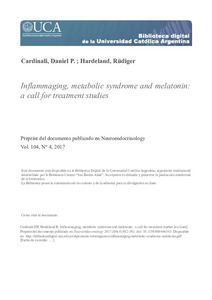Por favor, use este identificador para citar o enlazar este ítem:
https://repositorio.uca.edu.ar/handle/123456789/1450| Título: | Inflammaging, metabolic syndrome and melatonin : a call for treatment studies | Autor: | Cardinali, Daniel Pedro Hardeland, Rüdiger |
Palabras clave: | MEDICINA; MELATONINA; SINDROME METABOLICO; BIOMEDICINA; ESCLEROSIS MULTIPLE; ENVEJECIMIENTO; INFLAMACION; OBESIDAD; DIABETES; INSULINA | Fecha de publicación: | 2017 | Editorial: | Karger Publishers | Cita: | Cardinali D. P., Hardeland, R. Inflammaging, metabolic syndrome and melatonin : a call for treatment studies [en línea]. Preprint del documento publicado en Neuroendocrinology. 2017, 104 (4). doi:10.1159/000446543. Disponible en: https://repositorio.uca.edu.ar/handle/123456789/1450 | Resumen: | Abstract: The metabolic syndrome (MS) is a collection of risk factors for cardiovascular disease, including obesity, hypertension, hyperinsulinemia, glucose intolerance and dyslipidemia. MS is associated with low-grade inflammation of the white adipose tissue, which can subsequently lead to insulin resistance, impaired glucose tolerance and diabetes. Adipocytes secrete proinflammatory cytokines as well as leptin and trigger a vicious circle which leads to additional weight gain largely as fat. The imbalance between inflammatory and anti-inflammatory signals is crucial to aging. Healthy aging can benefit from melatonin, a compound known to possess direct and indirect antioxidant properties, to have a significant protective effect on mitochondrial function, to enhance circadian rhythm amplitudes, to modulate the immune system and to exhibit neuroprotective actions. Melatonin levels decrease in the course of senescence and are more strongly reduced in diseases related to insulin resistance. This short review article analyzes the multiple protective actions of melatonin that are relevant to the attenuation of inflammatory responses and progression of inflammaging and how melatonin is effective to curtail MS in animal models of hyperadiposity. The clinical data supporting the possible therapeutical use of melatonin in human MS are also reviewed. Since attention has been focused on the development of potent melatonin analogs with prolonged effects (ramelteon, agomelatine, tasimelteon, piromelatine) and in clinical trials these analogs were administered in doses considerably higher than those usually employed for melatonin, clinical trials on melatonin in the range of 50-100 mg/day are needed to further assess its therapeutic value in MS. | URI: | https://repositorio.uca.edu.ar/handle/123456789/1450 | ISSN: | 1423-0194 (online) 0028-3835 (impreso) |
Disciplina: | MEDICINA | DOI: | 10.1159/000446543 | Derechos: | Acceso Abierto | Fuente: | Preprint del documento publicado en Neuroendocrinology Vol. 104, N° 4, 2017 ISSN 1423-0194 (online) ISSN 0028-3835 (impreso) |
| Aparece en las colecciones: | Artículos |
Ficheros en este ítem:
| Fichero | Descripción | Tamaño | Formato | |
|---|---|---|---|---|
| inflammaging-metabolic-syndrome-melatonin.pdf | 1,39 MB | Adobe PDF |  Visualizar/Abrir |
Visualizaciones de página(s)
201
comprobado en 30-abr-2024
Descarga(s)
688
comprobado en 30-abr-2024
Google ScholarTM
Ver en Google Scholar
Altmetric
Altmetric
Este ítem está sujeto a una Licencia Creative Commons

